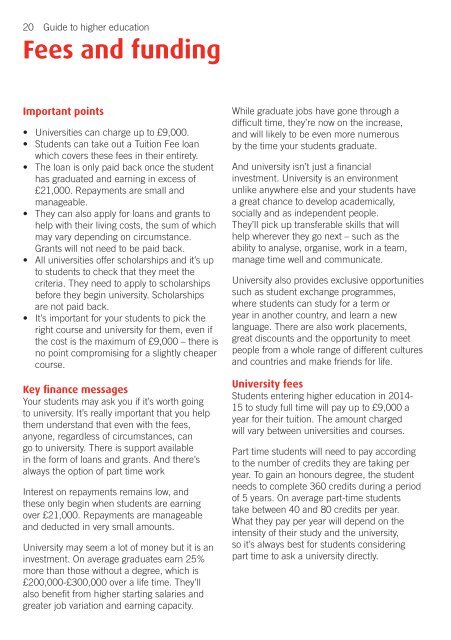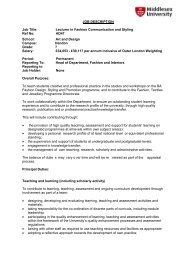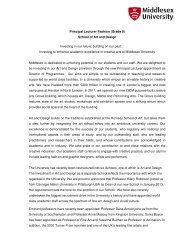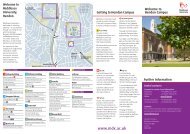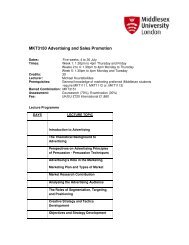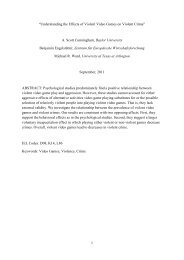Contact us: - Middlesex University
Contact us: - Middlesex University
Contact us: - Middlesex University
You also want an ePaper? Increase the reach of your titles
YUMPU automatically turns print PDFs into web optimized ePapers that Google loves.
20 Guide to higher education<br />
Fees and funding<br />
Important points<br />
• Universities can charge up to £9,000.<br />
• Students can take out a Tuition Fee loan<br />
which covers these fees in their entirety.<br />
• The loan is only paid back once the student<br />
has graduated and earning in excess of<br />
£21,000. Repayments are small and<br />
manageable.<br />
• They can also apply for loans and grants to<br />
help with their living costs, the sum of which<br />
may vary depending on circumstance.<br />
Grants will not need to be paid back.<br />
• All universities offer scholarships and it’s up<br />
to students to check that they meet the<br />
criteria. They need to apply to scholarships<br />
before they begin university. Scholarships<br />
are not paid back.<br />
• It’s important for your students to pick the<br />
right course and university for them, even if<br />
the cost is the maximum of £9,000 – there is<br />
no point compromising for a slightly cheaper<br />
course.<br />
Key finance messages<br />
Your students may ask you if it’s worth going<br />
to university. It’s really important that you help<br />
them understand that even with the fees,<br />
anyone, regardless of circumstances, can<br />
go to university. There is support available<br />
in the form of loans and grants. And there’s<br />
always the option of part time work<br />
Interest on repayments remains low, and<br />
these only begin when students are earning<br />
over £21,000. Repayments are manageable<br />
and deducted in very small amounts.<br />
<strong>University</strong> may seem a lot of money but it is an<br />
investment. On average graduates earn 25%<br />
more than those without a degree, which is<br />
£200,000-£300,000 over a life time. They’ll<br />
also benefit from higher starting salaries and<br />
greater job variation and earning capacity.<br />
While graduate jobs have gone through a<br />
difficult time, they’re now on the increase,<br />
and will likely to be even more numero<strong>us</strong><br />
by the time your students graduate.<br />
And university isn’t j<strong>us</strong>t a financial<br />
investment. <strong>University</strong> is an environment<br />
unlike anywhere else and your students have<br />
a great chance to develop academically,<br />
socially and as independent people.<br />
They’ll pick up transferable skills that will<br />
help wherever they go next – such as the<br />
ability to analyse, organise, work in a team,<br />
manage time well and communicate.<br />
<strong>University</strong> also provides excl<strong>us</strong>ive opportunities<br />
such as student exchange programmes,<br />
where students can study for a term or<br />
year in another country, and learn a new<br />
language. There are also work placements,<br />
great discounts and the opportunity to meet<br />
people from a whole range of different cultures<br />
and countries and make friends for life.<br />
<strong>University</strong> fees<br />
Students entering higher education in 2014-<br />
15 to study full time will pay up to £9,000 a<br />
year for their tuition. The amount charged<br />
will vary between universities and courses.<br />
Part time students will need to pay according<br />
to the number of credits they are taking per<br />
year. To gain an honours degree, the student<br />
needs to complete 360 credits during a period<br />
of 5 years. On average part-time students<br />
take between 40 and 80 credits per year.<br />
What they pay per year will depend on the<br />
intensity of their study and the university,<br />
so it’s always best for students considering<br />
part time to ask a university directly.


